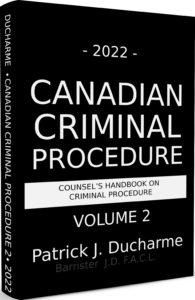 |
| Patrick Ducharme |
The Role of Defence Counsel
The Lawyer as Advocate
In Canada, Provincial legislatures have given Provincial law societies the power to govern the lawyers in their jurisdiction, including the responsibility of maintaining standards of professional conduct, and, of disciplining lawyers who fail to meet those standards. In general terms every lawyer must discharge his or her duties to a client, the court, members of the public, and fellow members of the profession with integrity. Each law society in Canada embraces the proposition that integrity is the fundamental quality of any person who seeks to practice as a member of the legal profession.
Arguably, lawyers who take on the role of a court room advocate may be particularly open to criticism and complaint. Trials are adversarial. The trial lawyer always has an opposing lawyer arguing and fighting against the interests of his client. Every law society in the country requires that an advocate’s duty to his client requires that he “fearlessly raise every issue, advance every argument, and ask every question, however distasteful, that he thinks will help his client’s case, and, to endeavor to obtain for his client the benefit of any and every remedy and defence that is authorized by law. These circumstances are ripe for complaints by opposing lawyers, the court, and sometimes the lawyer’s own client.
The rules of professional conduct are laid down by each Provincial law society. Lawyers sometimes complain that the rules are a lot easier to read than to follow. Conducting trials invariably places the lawyer/advocate in a precarious position. He must meet his duty to fearlessly raise every issue and make every argument while still fulfilling his duty as a judicial officer to assist the court with all relevant case law on any relevant issue, even if he is aware of case law that is contrary to or against the interests of the client that he represents.
The law society, for example, forbids a trial lawyer from deliberately refraining from informing the court of any law or jurisprudence that he considers to be directly on point and binding on the court, even if that case law has not been mentioned or raised by his opponent. The lawyer/advocate, according to his law society rules, has an even higher duty to the court than to the client that he has been paid to represent.
Prosecutors also owe a higher duty to the court to see that Justice is done through a fair trial, upon the merits, than to seek a conviction. The lawyer/advocate on behalf of a client has a similar high duty to the court to ensure that his representation of a client is discharged by fair and honourable means, without illegality, and in a manner consistent with the lawyer’s duty to treat the court with candor, fairness, courtesy and respect.
The role of defence counsel is fraught with danger. The trial lawyer’s duty to the court may, at times, seem quite conflicted with his duty to his client. The boundaries of those duties are sometimes not easy to determine. The case of Groia v. Law Society of Ontario1 represents a good example.
Mr. Groia, a lawyer in Ontario, was hired by a man to defend him against charges of insider trading and authorizing misleading news releases brought against him by the Ontario Securities Commission (“OSC”). The interactions during the trial between Groia and the prosecutor, all recorded and preserved on the transcripts and audio tapes of the trial, could only be characterized as containing escalating acrimony between the two lawyers. Their conduct during the trial included personal attacks, sarcastic outbursts, and allegations of professional impropriety; many of which were levelled by the prosecutor against Groia.

The above is the an excerpt of Patrick J Ducharme's book, Canadian Criminal Procedure Volume 2, available at Amazon or in bulk through MedicaLegal Publishing along with Criminal Trial Strategies.
Subscribe to Patrick Ducharme's Youtube Channel
